2017 was the year I lost my faith.
Not in religion — I’d lost that years ago. I’d walked away from God — or at least church — the year I came out of the closet and had to endure the crazy ways religious people dealt with me, the fact I’m gay, and with whatever a deity may or may not think about my sexuality.
So, at the close of 2016, I’d already lost my religion. But I was still clinging to a belief in the wisdom of age. I clung to a belief in my elders’ wisdom and compassion; that they’d know how to do what’s right for the world.
2017 put an end to that faith.
Maybe faith in God and faith in my elders are two sides of the same coin. Both ways of deflecting responsibility and deferring to others. And maybe the loss of faith in both God and the wisdom of age are part of the newly minted “quarter-life crisis” — growing up, finding yourself, and claiming your role in the world.
While loss of faith might have rendered me hopeless, spiraling into despair and uncertainty, it didn’t. Turns out, losing faith can be the surest way of finding something to believe in, paving the way for power that arises from deep inside us when we have nothing else. It’s a realization that can help us see things as they really are — like pulling back the curtain on the great Oz and finding an ordinary little man standing there. In losing my faith, I’m finding that shedding these illusions can awaken me to my own sense of self, my unique role in the world, and that I can step into it with a kind of courage and resolve I didn’t possess when I was unwittingly abdicating my responsibility because of misplaced faith. There are a number of reasons why I will no longer defer to the same group of elders — not when the world is too changed and too dangerous for any of us to assume anyone else has the key to the future.
So, 2017 was the ending of a two-stage loss of faith, but it also was the beginning of finding something new and immensely more powerful.
I grew up in California’s central valley, home to one of the most productive agricultural regions in the world and to a conservative brand of religion and politics that belie California’s progressive reputation. My father, a Presbyterian pastor and, though progressive himself, was the spiritual leader of a congregation that leaned pretty far to the Right. For decades, his religious denomination, the Presbyterian Church USA, had fought tooth and nail over the extent to which gays and lesbians could be included in the life of Presbyterian congregations.
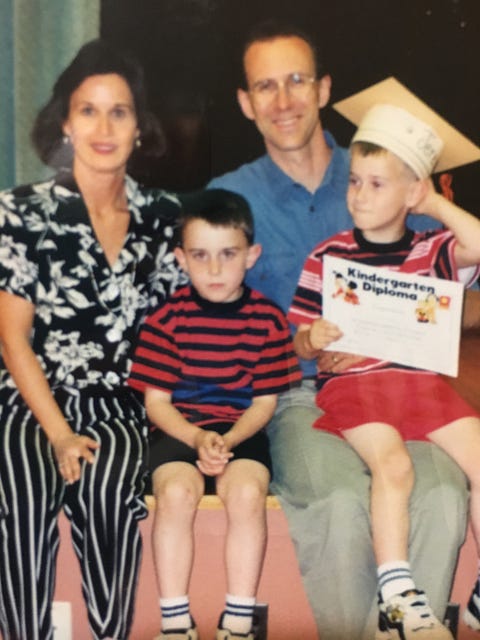
In my teenage years, my brother came out of the closet. Six months later, my parent’s marriage fell apart, my father was plunged into a leadership crisis, and I, gay myself — but secretly — kept it to myself.
I knew I was gay when my brother came out to me. But because of my congregations’ criticism of homosexuality burned into my psyche, his secret, which could have brought me a sense of companionship in the midst of my loneliness, only increased my anxiety. When he confided in me, I didn’t feel a moment of happiness, excitement, or closeness. Rather, the pit in my stomach tightened. I was no longer afraid for my own future, but for his as well.
My fears were soon affirmed. As news spread, his sexuality became a focal point of the congregation’s gossip. The adults around me, whom I had grown to trust and respect for their love, for God and for me, became hypocrites — espousing love but practicing an intolerance that shocked me.
While the estrangement from family friends bruised me, none of them cut as deep as the shunning of my godparents. My godparents, members and ordained elders of the church, were a fixture of my childhood. They taught my Sunday School classes, took my brother and me to the movies, and had us spend the night countless times throughout my childhood. They’d become a safe haven, a staple of my childhood. But when they became aware of my brother’s sexual orientation, it became very clear that their love was, indeed, conditional.
Time progressed, and my dad, the congregation, and my godparents were on a collision course regarding gay marriage. In June of 2014, the General Assembly of the Presbyterian Church USA would vote on a constitutional change in church governance that would allow same-sex marriages across the entire denomination. My father spoke publicly on the floor of the General Assembly in favor of the change, and 76% of the General Assembly of the Presbyterian Church agreed.
Upon returning from the General Assembly, the fury erupted. In a church meeting, my godfather called my dad an apostate. Some sent angry tirades to the church’s board of elders. Others left the church entirely. Another man, and ordained elder, stood up, stared into my dad’s eyes, and declared with a pointed finger: “You are a very dangerous man.”
For me, any semblance of a relationship between religion and decency was shattered. I felt shunned and abandoned by many of the people I needed most for mentorship and guidance, a space and community that used to feel like home became empty. I haven’t spoken with many from that church in years, and maybe that’s for the best.
Betrayed by too many of the church’s elders, I left organized religion and plunged myself into politics, which had become a fascination for me. Perhaps it was my desire to still believe in some form or human organization, some institution that could help us, if not save us from ourselves and the trouble the planet is facing.
But then came the Presidential campaign of 2016 and this past year with Trump and a Republican party that became for me as hypocritical as were those Christian elders I’d left behind in central California. Trouble was, these political elders were far more powerful and dangerous.
While I’d seen handwringing and name calling and politicking before, this tilt into mainstream fascism, the widespread scapegoating and marginalizing of minorities, the racist rhetoric, and the upsurge in violence unnerved me. It was all too reminiscent of the marginalization my family and I endured from those I once trusted and respected.
Perhaps I should have expected it. I didn’t.
And so, when 2017 dawned and Trump ascended to power, I fully expected that reasonable and rational Republican leaders would stand against the tide of fear-mongering and hatred that were the hallmark of the new administration and its supporters. I still had faith in the old-guard Republicans — leaders like Susan Collins, Lisa Murkowski, and John McCain.
But I was still naïve. I believed they’d find the moral courage, the political muscle stand up for American values and safeguard everyday citizens from the pillaging and destruction of this country.
But they fell.
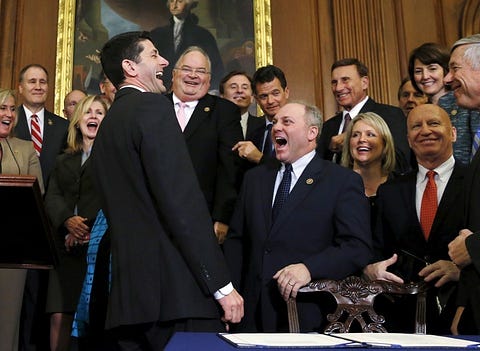
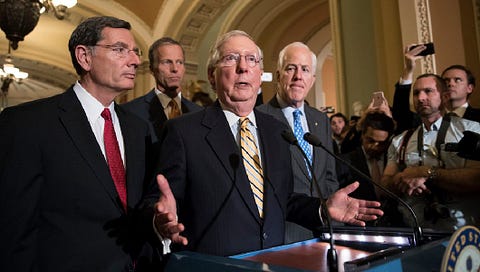
Our Republican “elders” could not hold back the rage and cultural anxiety from primarily an older, white demographic that fueled Trump’s victory and unhinged the Republican Party. And what was the result? We have watched the debasement of America’s institutions sprinkled with moral grandstanding rather than action.
We watch as the GOP act as a modern-day reverse Robin Hood, stealing wealth from the middle and lower classes to line the pockets of the wealthiest of the wealthy and their donors.
When confronted with the decision between maintaining power and condemning sexual assault and pedophilia, Republicans, by and large, chose power.
And now, we all stand by to see if they will muster any sort of courage to safeguard both Net Neutrality from its demise and the hundreds of thousands of Deferred Action for Childhood Arrivals individuals from impending deportation.
I won’t hold my breath.
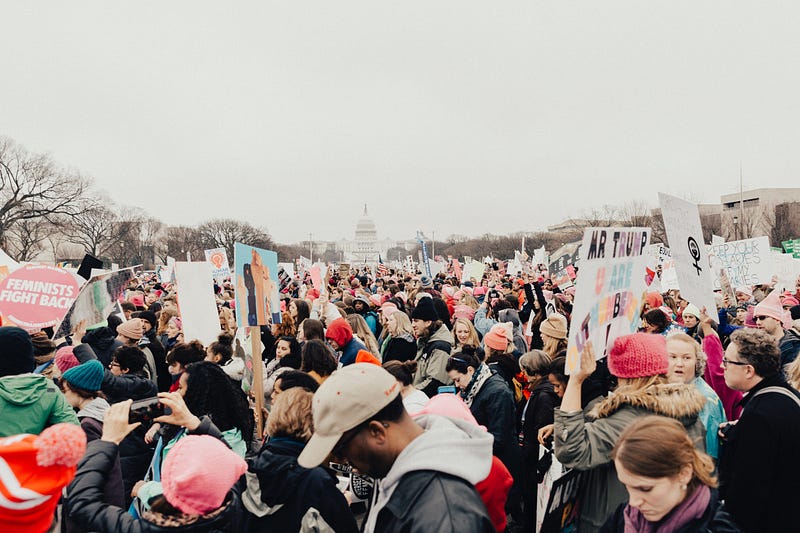 Photo by roya ann miller on Unsplash
Photo by roya ann miller on Unsplash
While 2017 was the year I lost faith in my elders’ ability to govern and address our world’s most pressing problems, I discovered something more powerful. Disillusionment, while painful, is necessary. It’s the shattering of false hopes; it’s a rising from the mist of illusion into the clearer light of day. In my case, my loss of faith is a liberation into my own individuation, the ending of reliance on others to act for me, the determination no longer to defer action to my elders. In fact, this loss of faith is, for me, a deep internal summon to action.
And I’m not alone.
A new power is rising. 2017 was also the year the collective civic consciousness sprouted in a generation written off as narcissistic and lazy. This collective consciousness is manifesting itself in a massive uptick in political involvement, the recognition that our voices, and our votes, matter. In a direct response to the election of Donald Trump, we saw millions across the world turnout in solidarity at the Women’s March. Tens of thousands of millennials signed up to run for office with organizations like Run for Something and a proliferation of other grass roots movements. These events were the tremors before a tidal wave.
This past month we felt the first thrust of its power.
In November, it first crashed in Virginia. It’s true that while Democrats’ larger-than-expected victories in Virginia were truly a team effort, and it’s also true that millennials and young voters carried considerable weight. In November, youth turnout rose to 34% in 2017 from 26% in 2013, and double that of 2009. Moreover, youth voters rejected the ideals of racism, fascism, and xenophobia by a 39-point margin, propelling Ralph Northam into office and shattering state Republican’s near super-majority in Virginia’s House of Delegates by capturing 16 seats. Then in December, Alabama voters 18–29 backed Democrat Doug Jones by a 22-point margin, with voters 30–44 following suit.
Although, let’s be clear, the real MVPs in Alabama were black voters, who surged to 30% of the electorate and voted at 95% for Jones. We owe them an enormous debt, and must ramp up our fight and support for voting rights, which consistently disenfranchise voters of color.
So, millennials turned out, but who won? Of the sixteen Democratic takeovers in the Virginia House of Delegates, six of them were Run For Something candidates, with high numbers of women, people of color, and the first transgender legislator in American history. Alabama elected a US attorney who prosecuted and brought to justice Ku Klux Klan members who murdered four black girls in a Birmingham church bombing. In Oklahoma, 26 year-old lesbian and mother of three, Allison Ikley-Freeman surpassed expectations and became a state senator in conservative territory. A wave of Millennial voters swept a diverse, progressive group of Millennials into office and are turning our political landscape into one much more representative of who we are as a nation.
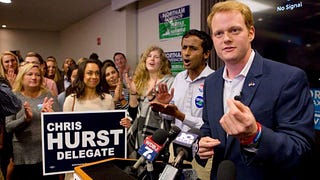
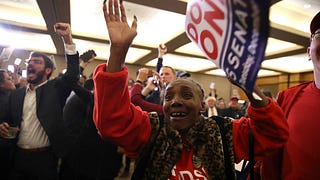
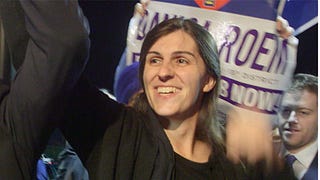
The rising political and moral consciousness amongst Millennials appears to mirror my own personal journey and loss of faith, where I learned that I cannot abdicate responsibility and defer power to my elders. As shown by this past year, young voters are not only beginning to flex our political muscle, but we are also propelling our own into political power.
This string of electoral victories is extremely important. We are beginning to influence policy, affect peoples’ wellbeing, and in doing so are sending signals from this rising block of young activists about what we value for our nation and the future of the planet.
Upon Trump’s election, parents around the country worried about how Trump’s disparaging behavior would impact our youngest generation and give way to condoning further bullying, racism, and xenophobia. We, as millennials, must remember that our actions, our votes, and our voices build a world for younger Americans to inherit. We can and must act as a counterweight to this obscenity, tilting the scales of decency towards compassion and inclusion.
We have proof that this youngest generation cares about the example we set. As seen by the massive amount of high school students who walked out of class following Trump’s election, or the group of kids suing the government over the effects of climate change on their future, this youngest generation is bold, brave, and passionate.
We must foster and support this passion and pave the way for the inclusive America that we envision.
Of course, we too could fail them. History could repeat itself.
But I will not abdicate my responsibility again. And I will not willingly let them lose their faith in the future and our collective ability to affect it for the common good. Not while I have breath.
And in this, I’m not alone.





